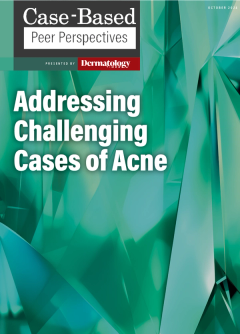
Critical Insights into Isotretinoin Use: Dietary Considerations and Food-Independent Options
Highlighting ways to maximize absorption of isotretinoin, Heather Woolery-Lloyd, MD, FAAD provides insights on dietary considerations and the role of micronized and food independent isotretinoin.
Episodes in this series

Video content above is prompted by the following questions:
•How would you approach counseling the patient and their family about the potential benefits and risks of isotretinoin treatment, including the importance of adherence to the prescribed dosing regimen and monitoring for side effects?
•What factors would you consider when determining the appropriate starting dose of isotretinoin for this patient, and how would you monitor their response to treatment over time?
•What are the key counseling points for the patient regarding the proper administration of isotretinoin, including the importance of taking the medication with food and any potential drug interactions to be aware of?
•What are the potential implications of the patient's dietary restrictions, particularly the need to maintain a low-fat diet, on the absorption and efficacy of the standard isotretinoin formulation? How might these dietary considerations impact treatment outcomes? Does the micronized version carry the same food requirements?
•Are you aware of any differences in efficacy between standard isotretinoin and micronized versions? How might factors such as dosage, dosing regimen, and formulation impact the clinical outcomes of isotretinoin treatment?
•Are there any specific subgroups of patients for whom the micronized may be particularly effective or less effective? How would you identify and manage potential predictors of treatment response and resistance in clinical practice?
Newsletter
Like what you’re reading? Subscribe to Dermatology Times for weekly updates on therapies, innovations, and real-world practice tips.














